- Home
- Quizzes
- My Quiz Activity
- Newsletters
- Sports Betting
- MY FAVORITES
- Add Sports/Teams
- SPORTS
-
NFL
- NFL Home
- Arizona Cardinals
- Atlanta Falcons
- Baltimore Ravens
- Buffalo Bills
- Carolina Panthers
- Chicago Bears
- Cincinnati Bengals
- Cleveland Browns
- Dallas Cowboys
- Denver Broncos
- Detroit Lions
- Green Bay Packers
- Houston Texans
- Indianapolis Colts
- Jacksonville Jaguars
- Kansas City Chiefs
- Las Vegas Raiders
- Los Angeles Chargers
- Los Angeles Rams
- Miami Dolphins
- Minnesota Vikings
- New England Patriots
- New Orleans Saints
- New York Jets
- New York Giants
- Philadelphia Eagles
- Pittsburgh Steelers
- San Francisco 49ers
- Seattle Seahawks
- Tampa Bay Buccaneers
- Tennessee Titans
- Washington Commanders
-
MLB
- MLB Home
- Arizona Diamondbacks
- Atlanta Braves
- Baltimore Orioles
- Boston Red Sox
- Chicago White Sox
- Chicago Cubs
- Cincinnati Reds
- Cleveland Guardians
- Colorado Rockies
- Detroit Tigers
- Houston Astros
- Kansas City Royals
- Los Angeles Angels
- Los Angeles Dodgers
- Miami Marlins
- Milwaukee Brewers
- Minnesota Twins
- New York Yankees
- New York Mets
- Oakland Athletics
- Philadelphia Phillies
- Pittsburgh Pirates
- San Diego Padres
- San Francisco Giants
- Seattle Mariners
- St. Louis Cardinals
- Tampa Bay Rays
- Texas Rangers
- Toronto Blue Jays
- Washington Nationals
-
NBA
- NBA Home
- Atlanta Hawks
- Boston Celtics
- Brooklyn Nets
- Charlotte Hornets
- Chicago Bulls
- Cleveland Cavaliers
- Dallas Mavericks
- Denver Nuggets
- Detroit Pistons
- Golden State Warriors
- Houston Rockets
- Indiana Pacers
- Los Angeles Clippers
- Los Angeles Lakers
- Memphis Grizzlies
- Miami Heat
- Milwaukee Bucks
- Minnesota Timberwolves
- New Orleans Pelicans
- New York Knicks
- Oklahoma City Thunder
- Orlando Magic
- Philadelphia 76ers
- Phoenix Suns
- Portland Trail Blazers
- Sacramento Kings
- San Antonio Spurs
- Toronto Raptors
- Utah Jazz
- Washington Wizards
-
NHL
- NHL Home
- Anaheim Ducks
- Boston Bruins
- Buffalo Sabres
- Calgary Flames
- Carolina Hurricanes
- Chicago Blackhawks
- Colorado Avalanche
- Columbus Blue Jackets
- Dallas Stars
- Detroit Red Wings
- Edmonton Oilers
- Florida Panthers
- Los Angeles Kings
- Minnesota Wild
- Montreal Canadiens
- Nashville Predators
- New Jersey Devils
- New York Islanders
- New York Rangers
- Ottawa Senators
- Philadelphia Flyers
- Pittsburgh Penguins
- San Jose Sharks
- Seattle Kraken
- St. Louis Blues
- Tampa Bay Lightning
- Toronto Maple Leafs
- Utah Hockey Club
- Vancouver Canucks
- Vegas Golden Knights
- Washington Capitals
- Winnipeg Jets
- NCAAF
- NCAAM
- Olympics
- Boxing
- Entertainment
- Lifestyle
- Golf
- MMA
- Soccer
- Tennis
- Wrestling
- More Sports
- RESOURCES
- My Account
- YB on Facebook
- YB on Twitter
- YB on Flipboard
- Contact Us
- Privacy Policy
- Terms of Service
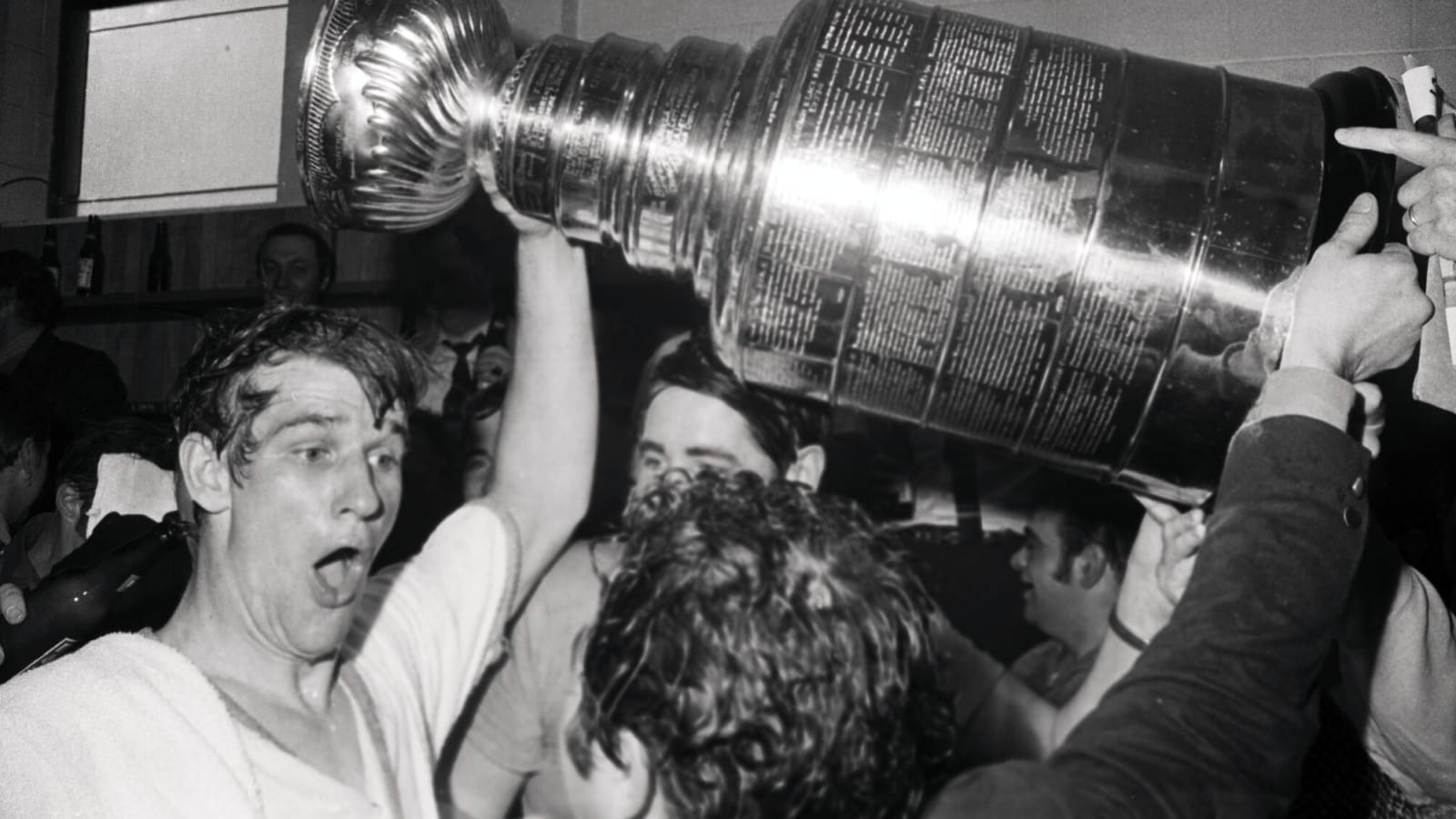
The best Stanley Cup Final games of all time
The grueling trek of the Stanley Cup playoffs is one of sports' greatest events. It gets even better when the Stanley Cup is on the line. There are too many memorable moments to count throughout the history of the Stanley Cup Final, and more specifically, notable games.
Here's our list of the 25 best games in Stanley Cup Final history.
25. 1985: Game 3 -- Edmonton 4, Philadelphia 3

There are Stanley Cup Final games known for great moments or fantastic finishes. Then there are those remembered for sensational individual performances. This Game 3 certainly falls into the latter category. Wayne Gretzky has almost two many playoff memories to count, but his first-period hat trick for the Oilers in this contest should rate pretty high. "The Great One" recorded a four-point night for Edmonton, which led 4-1 after two periods, but had to hold on after Philadelphia goals from Mark Howe and Brian Propp in the third period made things interesting.
24. 2006: Game 7 -- Carolina 3, Edmonton 1
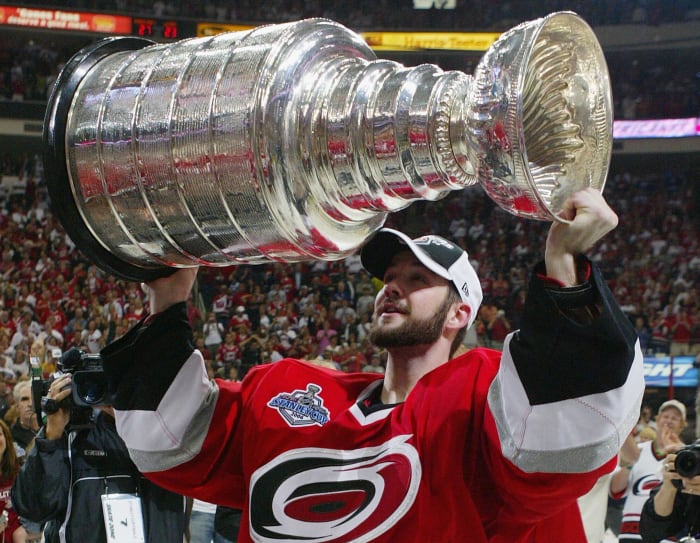
The Hurricanes blew a 3-1 lead in this series, but it was a good thing Game 7 was on their home ice. An Aaron Ward goal in the first period and Frantisek Kaberle's score in the second gave the hosts a 2-0 lead. But, in the early moments of the third, Edmonton sliced that deficit with Fernando Pisani's 14th goal of the postseason. However, star rookie and Conn Smythe Trophy winner Cam Ward was up to the task and kept the Oilers scoreless the rest of the way to give the Hurricanes franchise its first Stanley Cup.
23. 2003: Game 7 -- New Jersey 3, Anaheim 0
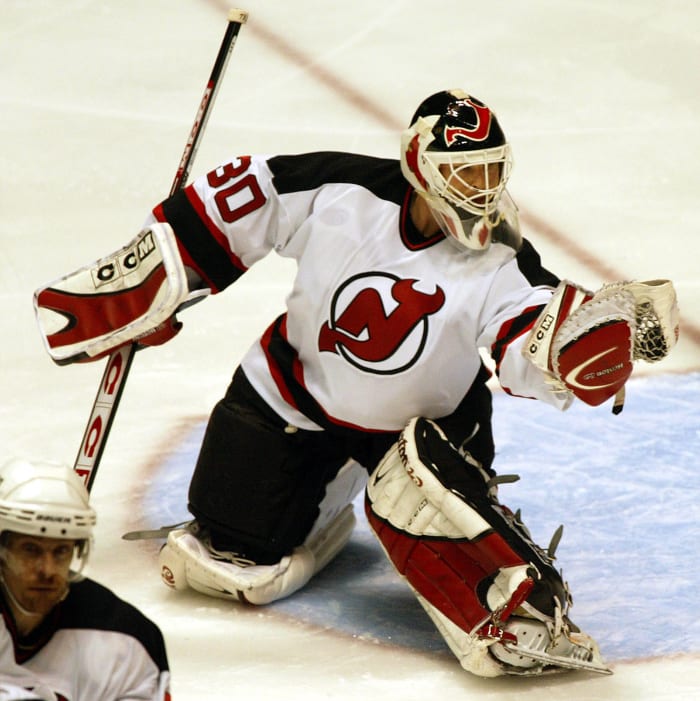
Sure, the Devils, two seasons removed from a Game 7 Stanley Cup Final loss (more on that in a bit), dominated this Game 7, but it was one of rather historic significance. New Jersey had turned into an established power, while Anaheim was making just its third playoff appearance since the franchise debuted in 1993-94. Yet, the Ducks had pushed this series to the limit. Keeping with the series trend, though, the home team won every game, as a pair of goals from Jeff Friesen, 24 saves from Martin Brodeur to post his third shutout of the series and an overall stellar defensive performance from the Devils led to their third Cup in nine seasons.
22. 1982: Game 1 -- New York Islanders 6, Vancouver 5 (OT)
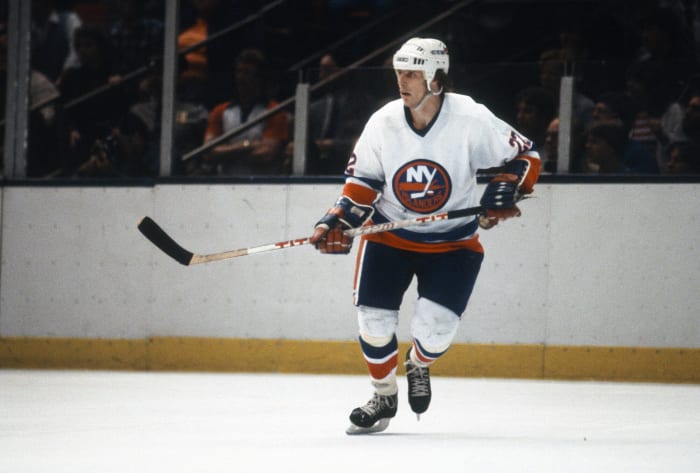
New York was the two-time defending Stanley Cup champion and the heavy favorite to beat the upstart Canucks. Vancouver, though, certainly wasn't intimidated in this series opener. In fact, the Canucks scored in the first 1 1/2 minutes through Thomas Gradin. The Islanders led 4-2 early in the second, but the Canucks scored three straight goals to lead 5-4 with roughly seven minutes to play in regulation. But less than two minutes later, the great Mike Bossy tied the game. Bossy then completed his hat trick by beating the clock to score the winner with 2 seconds remaining in overtime. The Islanders went on to sweep the Canucks for a third straight Cup celebration.
21. 1994: Game 1 -- Vancouver 3, New York Rangers 2 (OT)

The 1994 Stanley Cup Final is rightfully remembered for the Rangers ending their 54-year title drought (more on that shortly), but for entertainment purposes, the series opener was tough to beat. New York led 2-1 and appeared headed to a Game 1 victory at Madison Square Garden. However, the Canucks had other ideas when Martin Gelinas forced overtime on his goal with one minute remaining in regulation. Then with 34 seconds remaining in the overtime, Vancouver's Craig Adams one-timed the puck by Mike Richter for the victory. Canucks netminder Kirk McLean proved to be the star with 52 saves.
20. 1994: Game 7, New York Rangers 3, Vancouver 2
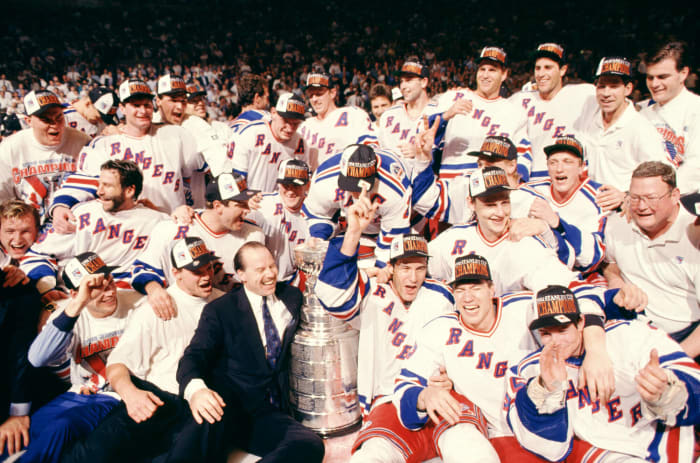
Now on to the Rangers winning their long-awaited Stanley Cup. In the legendary history of Madison Square Garden, the atmosphere in the building on June 14, 1994, was perhaps at its most electric. But there were also plenty of tense moments. However, the Rangers led 2-0 after a period and 3-1 after two, thanks to Mark Messier's power-play goal. But, Trevor Linden's own power-play tally early in the third period made it a one-goal contest and had the MSG faithful living on the edge. Vancouver had ample scoring chances the rest of the way, and Martin Gelinas and Nathan LaFayette each hit iron down stretch, but the Rangers held on to end their drought for what's become one of the most memorable sports moments of all time.
19. 2000: Game 6: New Jersey 2, Dallas 1 (2OT)

Fresh off a triple-overtime classic from Game 5, won 1-0 by Dallas on the road, New Jersey still had a chance to raise the Cup in Game 6, but it would have to come on the road, Which was actually fine, considering it won Games 3 and 4 at Dallas. Of course, it wouldn't be easy, and the Devils needed two more overtimes to prevail. All the regulation scoring came in the second period, then 8:20 into the second extra session, Jason Arnott, who would end up playing for Dallas two seasons later, one-timed the Devils to their second Stanley Cup triumph. The result overshadowed a stellar 43-save performance by Stars goalie Ed Belfour.
18. 1980: Game 6 -- New York Islanders 5, Philadelphia 4 (OT)
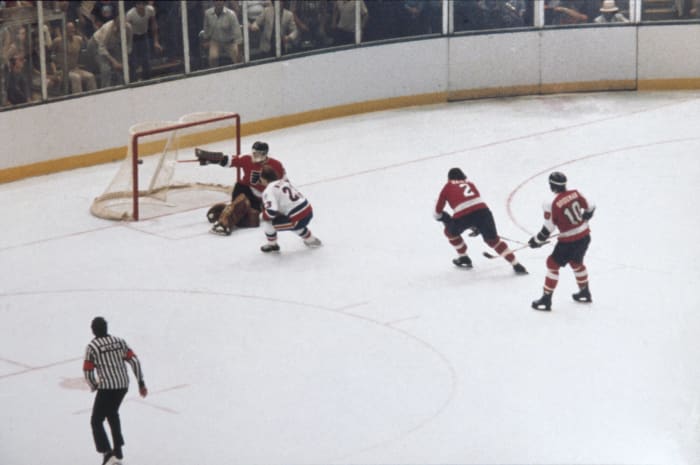
The 1980 Stanley Cup Final between the Islanders and Flyers didn't lack for offense. The teams combined for 51 goals. And, New York's Cup-clinching Game 6 victory wasn't even the highest-scoring game in the series. However, it was arguably the most exciting -- and controversial (due to the blatant missed offside call on the Isles' second goal). With the game tied 2-2 after a period, New York scored twice in the second for a 4-2 lead, but Philadelphia then recorded two of its own in the third to tie the contest. It went to overtime, where third-liner Bobby Nystrom pushed the puck by Flyers goalie Pete Peeters off a perfect cross-slot pass from John Tonelli to give the Islanders the first of four straight Stanley Cups.
17. 1964: Game 6 -- Toronto 4, Detroit 3 (OT)

Get used to reading about the Maple Leafs and Red Wings matching up to win the Stanley Cup. These Original Six stalwarts have met seven ties in the Stanley Cup Final, with the 1964 installment being the most recent. In '64, two games in the series went to overtime. Perhaps most notable was Game 6. Detroit lead 3-2 in the series and had a chance to clinch on home ice. The Red Wings even led 3-2 in Game 6, until Toronto's Billy Harris scored his first goal of the playoffs late in the second period to level the score. The game remained tied until the 1:43 into overtime, when Toronto's Bob Baun, who exited earlier in the contest after taking a Gordie Howe slap shot to his ankle but returned to courageously score the winner and even the series.
16. 2010: Game 6 -- Chicago 4, Philadelphia 3 (OT)

Chicago held a 3-2 series edge in 2010 but knew it would be tough trying to close things out in Game 6 at Philadelphia, where it lost Games 3 and 4. The Blackhawks trailed 2-1 near the midway mark of the second period when Patrick Sharp tied the game and Andrew Ladd put them ahead later in the frame. However, the Flyers tied it at 3-3 through Scott Hartnell's goal with roughly four minutes left in regulation. Yet, with a 49-year Cup drought on the line, Chicago came through 4:06 into overtime. Patrick Kane slipped the puck past Philadelphia netminder Michael Leighton and under the bottom padding inside the net. But, only Kane seemed to realize it went in and broke out into celebration while Flyers players, fans, and even some of his own teammates wondered if the game had actually ended.
15. : Game 7 -- Colorado 3, New Jersey 1

The Devils were looking to repeat as Stanley Cup champions and were good enough to get it done in 2000-01. Then again, the Avalanche were the Presidents' Trophy winners. It was fitting that the top two seeds in the Stanley Cup playoffs would need a deciding Game 7. And, it would be Colorado, the league's best team all season, that got the job done. Alex Tanguay scored the game's first two goals and assisted on Joe Sakic's second-period score to put the hosts up 3-0. This moment is also remembered for longtime Boston Bruin and current Avs defenseman Ray Bourque hoisting the Cup for the only time in his 22nd and final NHL season.
14. 2009: Game 7 -- Pittsburgh 2, Detroit 1
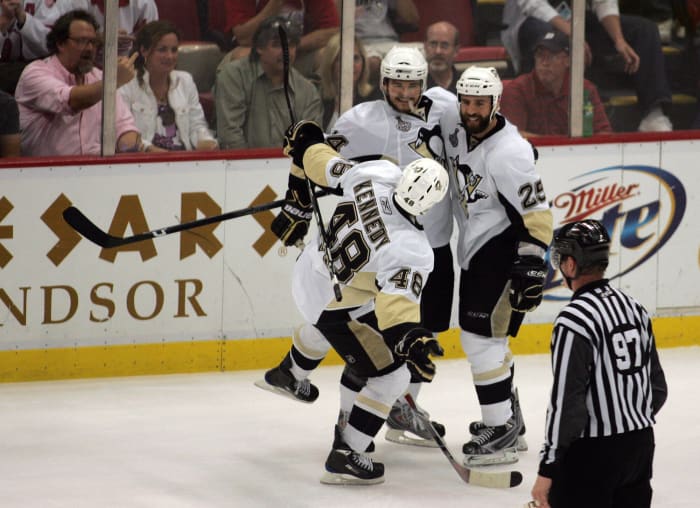
Detroit was looking to win back-to-back Stanley Cups by beating the Penguins for a second consecutive season. However, after the Red Wings won the first two games of the series -- at home -- the rest belonged to Pittsburgh. Not only did Detroit fail to win any of the three games at Pittsburgh, but couldn't use home ice in Game 7 to its advantage. And part of a Pittsburgh roster that included names like Crosby and Malkin, it was Max Talbot who was the star. His second-period goals gave the Penguins a 2-0 lead. Detroit got one back through Jonathan Ericsson in the third, but despite only one shot on goal in the final period, Pittsburgh held steady to cap its stunning series comeback.
13. 2004: Game 7 -- Tampa Bay 2, Calgary 1
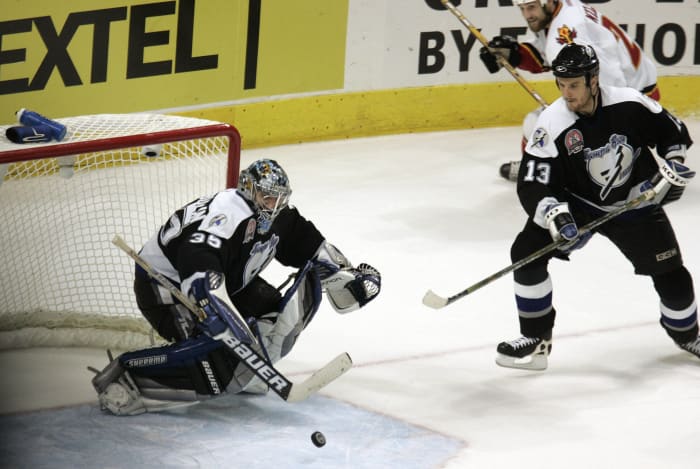
The Tampa Bay Lightning's moment of glory in winning the franchise's first Stanley Cup concluded with one of the tensest Game 7's in league history. Ruslan Fedotenko scored in each of the first two periods to give the Lightning a 2-0 lead. However, the drama was amped up when Calgary's Craig Conroy scored roughly midway through the third, and things got even more chaotic as the Flames pressured Nikolai Khabibulin the rest of the way. But, Tampa Bay survived to raise the Cup as the southern-most NHL club to win it all.
12. 1942: Game 4 -- Toronto 4, Detroit 3

The 1942 Stanley Cup Final was known for the Red Wings squandering a 3-0 lead in the series. But, the Maple Leafs, obviously, had something to do with the collapse that led to their historic comeback. And even in Game 4 at Detroit, things looked bleak for Toronto, which trailed 2-0 more than halfway through the second period before tying the game. Then down 3-2 in five minutes into the third, the Maple Leafs staved off elimination thanks to goals by Syl Apps and Nick Mertz. This contest also featured one of the ugliest moments in NHL history, when Detroit coach Jack Adams punched referee Mel Harwood at the end of the game, causing plenty of debris to be tossed onto the ice. Adams was suspended for the rest of the series.
11. 2013: Game 6, Chicago 3, Boston 2
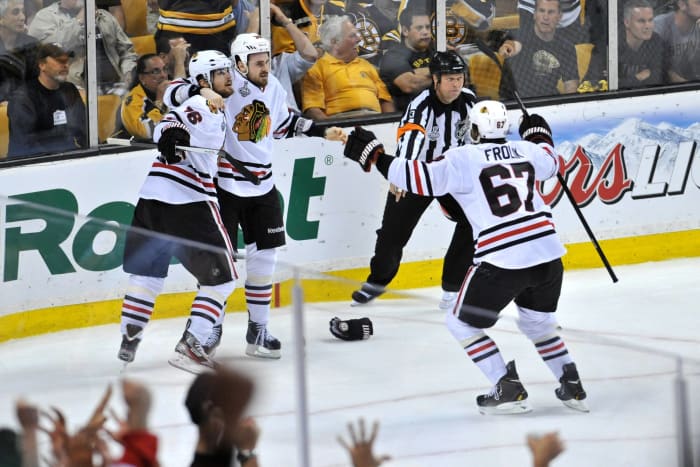
The Blackhawks trailed their 2013 Cup final with Boston 2-1, then turned things around with back-to-back victories to set up a clinching opportunity in Game 6 at Boston, However, the Bruins broke a 1-1 tie through Milan Lucic's goal with 7:49 remaining in regulation. As the clock ticked down, it appeared Boston would hold on to force a Game 7 back in Chicago. The Blackhawks, however, thought otherwise thanks to the greatest 17 seconds in the history of the franchise. First, Bryan Bickell tied it with 1:16 left in the third on a pass from Jonathan Toews. Then, Dave Bolland, with 58.3 seconds to go and from a rebound off the post, positioned himself to score the go-ahead goal that gave Chicago its second Cup in four years.
10. 2013: Game 1 -- Chicago 4, Boston 3 (3OT)

While the 2013 series between the Blackhawks and Bruins ended in dramatic fashion, it opened much the same way. Game 1 at Chicago was an instant classic that needed a third overtime to complete. Boston led 3-1 with 12 minutes left in regulation, but Chicago goals from Game 6-hero Dave Bolland and light-scoring defenseman Johnny Oduya tied the contest, Then 12:08 into the third overtime, Andrew Shaw, who set up Bolland's goal, got the second deflection of Michal Rozsival's shot from the near point by Bruins goalie Tuukka Rask, who along with Chicago's Corey Crawford combined for 110 saves on the night.
9. 1942: Game 7 -- Toronto 3, Detroit 1

It was fitting that Toronto capped its historic comeback from 3-0 down in the 1942 Stanley Cup by again coming from behind to win Game 7. Though Toronto was playing at home and armed with plenty of momentum after winning three straight to tie the series, Detroit struck first with Syd Howe's goal early in the second period. However. the third period belonged to the Maple Leafs. Goals by Sweeney Schriner sandwiched Pete Langelle's score, and Toronto raised the Cup for the first time in a decade.
8. 1999: Game 6 -- Dallas 2, Buffalo 1 (3OT)

This Game 6 will forever be known for the great Brett Hull finally winning the first of his two Stanley Cups. However, this one came with plenty of controversy. The game featured 104 shots but just three goals, and Hull's winner came at 14:51 of the third overtime -- the longest Final contest to decide the Cup. Replay showed that his skate was in the crease while pushing the puck past Buffalo netminder Dominik Hasek (48 saves) amid a net-front scrum. However, the officials claimed Hull kept possession and the goal stood, much to the dismay of the Sabres. Still, as far as intrigue goes, it doesn't get much better than this classic.
7. 1996: Game 4 -- Colorado 1, Florida 0 (3OT)

The Avalanche swept Florida to win the franchise's first Stanley Cup in 1996, but Game 4 of this series remains one of the great tests of endurance in all sports. Yes, Uwe Krupp's goal 4:31 into the third overtime ultimately gave Colorado the championship. But, the play of teammate Patrick Roy (63 saves), who allowed just four goals on 151 shots faced during the series, and Florida netminder John Vanbiesbrouck (55 saves) was the story, and two of the greatest individual efforts in the history of this particular sport.
6. 1928: Game 2 -- New York Rangers 2, Montreal Maroons 1 (OT)

The 1928 series was unique considering all games were played at the Montreal Forum (because Madison Square Garden was unavailable) and that the Rangers won their first Stanley Cup. The series, though, might be best known for New York coach Lester Patrick stepping into goal after goaltender Lorne Chabot was injured during Game 2. The Rangers' backup netminders Alex Connell and Hugh McCormick were actually in the crowd, but the Maroons' staff would not allow either to play. So, the 44-year-old Patrick stepped in, and while he did allow Nels Stewart's tying goal late in the third, New York prevailed thanks to Frank Boucher's score in overtime and evened the series.
5. 1971: Game 7 -- Montreal 3, Chicago 2

Prior to Game 7 of the '71 series, the home team won each of the previous six. However, that was about to change as Montreal seemed primed to win its fifth Stanley Cup in seven seasons. Yet, it was the Blackhawks who opened the scoring on Dennis Hull's goal late in the opening period. Chicago made it 2-0 through Danny O'Shea at the 7:33 mark of the second. But, Montreal countered with goals from Jacques Lemaire and NHL legend Henri Richard late in the second. Then, Richard struck again with the eventual game-winner just 2:34 into the third and the Canadiens' dominance continued.
4. 1945: Game 7 -- Toronto 2, Detroit 1
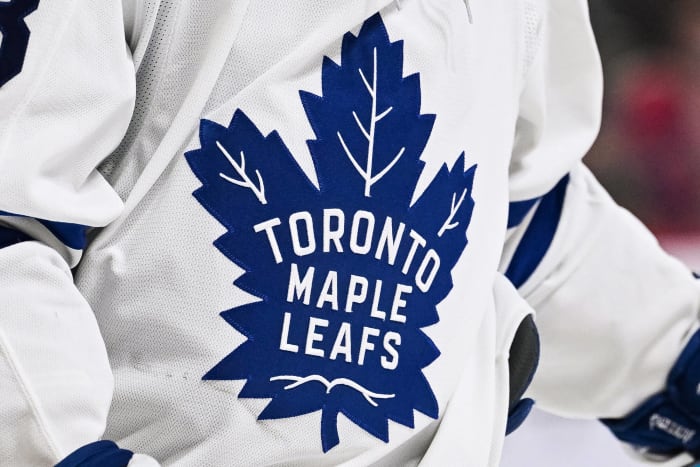
As we know, it was three years earlier when the Maple Leafs overcame a 3-0 hole to stun the Red Wings. Well, Toronto almost returned the favor in '45. The Leafs posted three straight shutouts to open their own 3-0 lead in this series, but Detroit regrouped, found some offense, and posted two shutouts itself to win the next three. However, the Maple Leafs were able to stop the bleeding in Game 7 at Detroit. Though it didn't come easy. Detroit's Murray Armstrong tied the game with a goal 8:16 into the third period, but Babe Pratt broke the tie for the Leafs with a little less than eight minutes to play in regulation.
3. 1970: Game 4 -- Boston 4, St. Louis 3 (OT)

Yes, the Bruins swept the Blues to win their first Stanley Cup in nearly 30 years in 1970. However, the way in which Boston capped the achievement remains one of the most lasting images in all of sports. Just 40 seconds into overtime of Game 4 at the famed Boston Garden, Bruins legend Bobby Orr skated into the slot, then slipped the puck past St. Louis netminder Glenn Hall for the Cup-winning goal. Attempting to celebrate with his arms in the air, Orr was tripped by Blues defenseman Noel Picard, and went flying into the air with arms and stick stretched out as if he was Superman. For many Bruins fans, he was.
2. 1954: Game 7 -- Detroit 2, Montreal 1 (OT)

The Red Wings have had a knack for winning Stanley Cups when reaching the limit. In fact, Detroit is the only team in NHL history to win the only two Stanley Cup Final series that went to an overtime Game 7. Rewind to 1954, and this remains the last time that happened. Montreal opened the scoring near the midway point of the first period through Floyd Curry. Detroit then leveled the contest on Red Kelly's goal early in the second. The game eventually went to overtime, where just 4:29 in, Tony Leswick's shot deflected off the glove of Canadiens defenseman Doug Harvey and in for the winner. Disgruntled Montreal players skated off the ice without taking part in the traditional post-series handshake.
1. 1950: Game 7 -- Detroit 4, New York Rangers 3 (2OT)
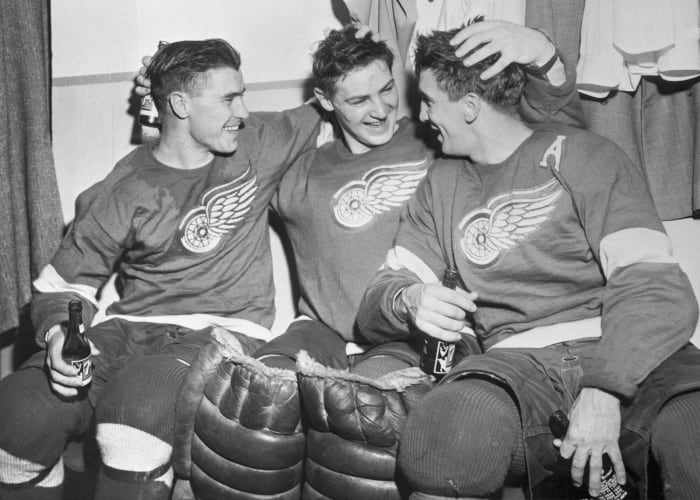
One overtime was not enough to decide the winner of the 1950 Stanley Cup Final. While it can be argued that this entire series, which featured the Rangers playing two "home" games in Toronto and two other contests needing overtime, is the best of all time. Well, we believe this is the greatest Stanley Cup Final game ever played. New York led 2-0 after one period, but three second-period goals from the Red Wings left the game tied 3-3, after two and ultimately at the end of regulation and the first overtime. Pete Babando's second goal of the game -- and the playoffs -- at 8:31 into the second extra session proved to be one of the most memorable goals in Red Wings' history.
A Chicago native, Jeff Mezydlo has professionally written about sports, entertainment and pop culture for parts of four decades. He was an integral member of award-winning sports sections at The Times of Northwest Indiana (Munster, Ind.) and Champaign (Ill.) News-Gazette, where he covered the NFL, PGA, LPGA, NCAA basketball, football and golf, Olympics and high school athletics. Jeff most recently spent 12 years in the editorial department at STATSPerform, where he also oversaw coverage of the English Premier League. A graduate of Northern Illinois University, Jeff's work has also appeared on such sites at Yahoo!, ESPN, Fox Sports, Sports Illustrated and NBA.com. However, if Jeff could do it again, he'd attend Degrassi Junior High, Ampipe High School and Grand Lakes University
More must-reads:
- NHL head coaches with the most wins
- The most memorable defunct NHL teams
- The '500 NHL goals club' quiz
Breaking News
Customize Your Newsletter
 +
+
Get the latest news and rumors, customized to your favorite sports and teams. Emailed daily. Always free!
Use of this website (including any and all parts and
components) constitutes your acceptance of these
Terms of Service and Privacy Policy.
This site is for entertainment purposes only.
There is no gambling offered on this site.
Gambling Problem? Call 1-800-Gambler.
